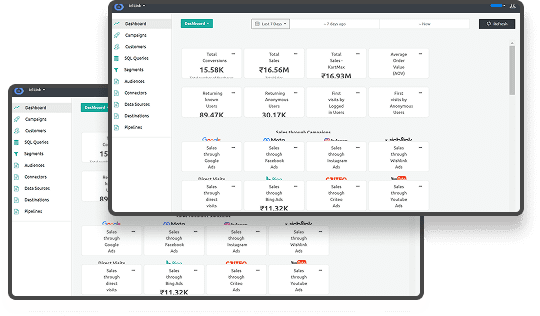As third-party cookies become a thing of the past, businesses must adapt to a cookieless world that prioritizes user privacy and consent. Understanding how this shift impacts digital marketing strategies is crucial to staying competitive and compliant in the evolving online ecosystem.
What Is a 'Cookieless' Future?
The move towards a "cookieless" future marks a significant transformation in how websites track and interact with users. Third-party cookies, long used to gather data for targeted ads, are being phased out by major browsers. As privacy concerns grow and regulations tighten, marketers must adapt to this cookieless future. This change directly impacts how you, as a marketer or business owner, gather data on user behavior.
In a cookieless environment, tracking without third-party cookies will become more challenging. Browsers like Chrome and Firefox are leading the charge toward a privacy-first approach. For marketers, this raises questions about accurate targeting, customer journey insights, and measuring campaign success. Preparing for this shift means rethinking your data strategies and focusing on alternatives like first-party data to continue delivering personalized experiences.
As third-party cookies disappear, it's crucial to understand why this change is happening. On that note, let's explore the reasons driving the shift.
Reasons for the Shift Away from Third-Party Cookies
We know that the digital world is undergoing a major transformation, and third-party cookies are becoming a thing of the past. As a marketer, you need to understand the reasons behind this shift to prepare for a cookieless future. Several factors, from consumer privacy concerns to changes in regulations, have accelerated this transition. Here’s why third-party cookies are being phased out:
- Consumer Distrust and Data Privacy Concerns:
Consumers are more aware of how their data is being collected and used. Many have grown distrustful of third-party tracking practices. In a cookieless environment, trust becomes crucial, as businesses must collect data responsibly and transparently to maintain customer relationships.
- Stricter Data Privacy Regulations (GDPR, CCPA):
Data privacy laws like the General Data Protection Regulation (GDPR) and California Consumer Privacy Act (CCPA) have made third-party cookies less viable. These regulations give users more control over their data, limiting how businesses can track their online activity. As more regions adopt similar rules, the cookieless world continues to expand.
| Regulation | Region | Effect on Cookies |
| GDPR | European Union | Requires user consent for data collection. |
| CCPA/CPRA | California, USA | Provides the right to opt out of tracking. |
| LGPD | Brazil | Requires clear consent before tracking and data sharing. |
| PIPL | China | Demands user consent and limits cross-border data transfer. |
| POPIA | South Africa | Consent needed for collecting and processing cookies. |
| PIPEDA | Canada | Requires consent and transparency in data usage policies. |
| UK DPA | United Kingdom | Similar to GDPR; mandates clear consent for data collection. |
| PDPA | Singapore | Obligates organizations to inform users about cookie data use. |
| APP | Australia | Requires explicit user consent, especially for sensitive data. |
- Browser Policies and Support:
Major browsers like Google Chrome, Mozilla Firefox, and Apple Safari have either limited or announced plans to phase out third-party cookies. Initially set to be completed by 2022, Google’s third-party cookie phase-out has now morphed into a consent-driven approach. This resembles what Apple iOS did with App Tracking Transparency popups, requiring users to explicitly allow for tracking by third parties. More than 50% of iOS users have opted out of tracking since it’s introduction in 2021. Inability to track visitors over an extended window drastically affects all attribution reports and leads to sub optimal deployment of ad budgets.
This shift is making it harder for businesses to rely on traditional tracking methods. These browsers are paving the way for a cookieless future, leaving businesses no choice but to adapt.
- Technological Changes:
Advances in technology have made alternatives to cookies more appealing. New tracking methods, such as first-party data and server-side tracking, provide more accurate and privacy-friendly ways to collect insights. These innovations are helping businesses operate effectively in a cookieless environment while complying with privacy regulations.
As third-party cookies fade away, the impacts are wide-reaching, so let’s explore how these changes affect users, site owners, and marketers.
Impacts of a Cookieless Future
As third-party cookies disappear, you’ll face new challenges and opportunities. From better privacy to adopting new targeting methods, here’s how the cookieless world will impact key players.
- Impacts on Users: Better Privacy and Security:
Users will benefit from stronger privacy protections. Without third-party cookies tracking them, users can enjoy a more secure browsing experience. This increased privacy helps build trust between businesses and their audiences.
- Users gain more control over their data.
- Websites become more transparent about data collection.
Ingest Labs simplifies this process by offering tools that help businesses comply with these regulations and ensure user trust.
- Impacts on Site Owners: Adopting First-Party Data Strategies:
As a site owner, you’ll need to shift toward first-party data strategies. In a cookieless environment, collecting data directly from users through your site is key. This allows for continued personalized experiences while maintaining compliance with privacy laws.
Check out Ingest Labs’ first-party data strategies here.
- Impacts on Marketers: New Targeting Methods:
Marketers will need to adopt new targeting strategies. The cookieless future forces you to move away from third-party cookies and embrace alternatives like contextual advertising, first-party data, and AI-driven insights. These new methods ensure effective campaigns without compromising user privacy.
- Contextual ads deliver relevant content without relying on user behavior tracking.
- First-party data helps personalize ads based on direct user engagement.
- Financial and Competitive Implications:
The cookieless shift will impact your ad spend and competitiveness. Companies that quickly adapt to first-party data strategies will see better returns on their ad investments. Those that lag behind may struggle to maintain an edge in a privacy-first market.
As these changes unfold, the need for new strategies becomes evident. Let’s now explore how you can prepare with these strategies.
Strategies for Preparing for a Cookieless Future
To stay competitive, you’ll need to adopt strategies that focus on data privacy and more direct customer engagement. Here’s how you can adapt to the cookieless era.
- Implement First-Party Data Strategies:
First-party data is crucial in a cookieless environment. Start by collecting data directly from your customers through interactions on your website, mobile app, or email lists. This data is more reliable and privacy-compliant than third-party cookies.
- Collect data from site visitors and customers.
- Use customer engagement data for personalization.
- Collect Zero-Party Data:
Zero-party data refers to the information users voluntarily share with your business. It’s more accurate and tailored to their needs, helping you create more personalized experiences.
| Data Type | Example |
| First-Party Data | Website interactions, purchase history |
| Zero-Party Data | Surveys, preferences shared by the user |
Shivangi Avasthi on her LinkedIn post says,
“Well, there's this new thing called zero-party data that's getting really important. It's different from the data they gather by watching what we do (that's first-party data) or from other places (that's third-party data).”
- Emphasize Contextual Advertising:
Contextual advertising shows relevant ads based on the content users engage with. This strategy works well in a cookieless world as it doesn’t rely on tracking users across multiple sites.
- Align ads with the content users are viewing.
- Provide relevant messages without compromising privacy.
John King from eHealth Queensland says in his LinkedIn post,
“While a cookieless future presents many challenges, it also presents many opportunities for marketers to invest in developing strategies to focus on first-party data collection”
- Invest in Alternative Identifiers:
New identifiers, such as Ingest ID, can help you track customer journeys without cookies. These solutions are privacy-first and ensure you continue gaining insights while complying with regulations.
- Use first-party identifiers to track users.
- Maintain consistent customer journeys across devices.
By preparing early and adopting these strategies, you’ll thrive in a cookieless world. Next, we’ll explore why first-party data is the key to cookieless targeting.
First-Party Data: The Key to Cookieless Targeting
First-party data has emerged as the most reliable resource in a cookieless future. By collecting data directly from your audience, you can continue to target effectively while respecting privacy regulations. Here’s why first-party data is essential for cookieless targeting.
- Types of First-Party Data:
First-party data comes from interactions that happen directly between you and your customers. This data is more accurate and reliable than third-party cookies, making it key for effective marketing.
- Website interactions: Track user behavior on your site, like page views or purchases.
- Mobile apps: Collect data on in-app actions and user preferences.
- Email subscriptions: Capture user consent and gather data through email marketing.
- Compliance with Data Privacy Regulations:
In a cookieless world, compliance with data privacy laws is critical. First-party data is more compliant with regulations like GDPR and CCPA because it’s collected directly from the user with their consent.
- Deriving Actionable Insights from First-Party Data:
First-party data offers valuable insights that allow you to personalize experiences and improve targeting. It helps you analyze user behavior, segment audiences, and run effective campaigns without relying on cookies.
- Segment users based on their interactions.
- Personalize messages and campaigns for better engagement.
- How Ingest Labs Fits Into the Picture
Ingest Labs fully supports the transition to first-party data as the foundation for targeting in a cookieless world. With solutions like Ingest ID, businesses can assign unique first-party IDs to track user behavior across multiple interactions and devices, providing a seamless and privacy-compliant way to gather essential data. Additionally, Ingest IQ offers real-time insights from both web and mobile platforms, ensuring that businesses can optimize their campaigns based on actionable, first-party data, all while staying compliant with regulations like GDPR and CCPA. This enables more personalized marketing and better targeting without relying on third-party cookies.
Next, let’s read about the various cookieless solutions that are emerging as alternatives.
Exploring Cookieless Solutions
As the cookieless future becomes a reality, businesses need new ways to gather and use data. Various cookieless solutions are emerging, offering alternatives to third-party cookies while maintaining privacy. These solutions allow you to continue tracking and optimizing without compromising user trust.
Stavriana Nathanail from Digital Tree says in her LinkedIn post,
“Most marketers indicate that their marketing efforts depend on third-party cookies to some extent!”
- Google Topics API and FLEDGE API:
Google is introducing new APIs to replace third-party cookies. The Topics API tracks users' interests without identifying them, while FLEDGE helps with retargeting ads in a privacy-friendly way.
- Topics API: Assigns interest-based topics to users for targeted ads.
- FLEDGE API: Allows retargeting without cross-site tracking.
- Digital Fingerprinting and Its Privacy Implications:
Digital fingerprinting collects unique information about users, like device settings, to track them without cookies. While it provides valuable insights, it raises concerns over privacy and the potential for invasive tracking.
- Digital fingerprinting offers detailed tracking without cookies.
- It may conflict with privacy regulations and user consent.
- User Identity Graphs and Their Benefits:
User identity graphs consolidate data across devices and platforms. This allows you to build a complete profile of each user, making it easier to track behavior and personalize ads in a cookieless world.
- Create unified profiles across multiple devices.
- Optimize targeting without third-party cookies.
- Use of AI and Machine Learning:
AI and machine learning help predict user behavior and personalize ads in real-time. These technologies enable more accurate targeting by analyzing first-party data, allowing businesses to remain competitive in the cookieless era.
- AI predicts user preferences based on behavior.
- Machine learning optimizes ads without needing cookies.
- Ingest Labs: Advanced Cookieless Solutions
Ingest Labs is at the forefront of cookieless solutions, helping businesses navigate a privacy-first world with tools that allow for accurate data tracking without relying on third-party cookies. Through Ingest ID and Ingest IQ, Ingest Labs enables companies to collect and analyze first-party data, offering a robust alternative to traditional cookie-based methods.
- Ingest ID assigns unique first-party IDs to visitors, tracking their behavior across multiple devices and sessions, ensuring personalized marketing while adhering to privacy regulations.
- Ingest IQ provides real-time data insights for web and mobile app interactions, allowing businesses to optimize customer journeys and enhance user experience without compromising user privacy.
With Ingest Labs’ comprehensive solutions, businesses can continue optimizing ad performance and targeting users with personalized experiences while respecting their privacy.
With these emerging solutions, you can continue running effective campaigns while respecting user privacy. Next, let’s explore the challenges of implementing these cookieless targeting methods.
Challenges of Implementing Cookieless Targeting
Implementing cookieless targeting comes with its own set of challenges. While privacy is prioritized, businesses face difficulties in balancing effective targeting and compliance. Here’s a look at the key challenges you may encounter when transitioning to a cookieless environment.
- Balancing Effective Targeting with User Privacy:
Cookieless solutions require you to rethink how you target users. Finding the balance between maintaining personalization and respecting privacy can be tricky. You’ll need to explore new methods, like first-party data or contextual targeting, without losing campaign effectiveness.
- Shift to first-party data for personalization.
- Explore contextual targeting for more privacy-friendly solutions.
- Compliance with Privacy Regulations:
Privacy laws such as GDPR and CCPA impose strict requirements on data collection. Staying compliant while using cookieless tracking methods can be complex. You must ensure that your data strategies align with these regulations to avoid penalties.
- Need for Transparency in Data Collection:
Users expect transparency when it comes to data collection. In a cookieless world, it’s important to clearly communicate how their data is used. Building trust with your audience requires clear policies and consent management practices.
- Inform users about data collection practices.
- Implement consent management tools.
- Investment in New Tools and Platforms:
Switching to cookieless targeting requires investment in new tools and technologies. You may need to adopt solutions like Ingest ID or contextual advertising platforms to stay competitive. This shift involves both financial resources and time to learn and implement new systems.
- Invest in first-party data solutions like Ingest ID by Ingest Labs.
- Train your team on these new technologies and tools.
Overcoming these challenges is crucial for succeeding in the cookieless world. Let’s now conclude with a summary and call to action for adapting to these new strategies.
Conclusion
The shift to a cookieless future is inevitable. As third-party cookies fade away, you must adapt by focusing on privacy-first strategies. First-party data, contextual advertising, and alternative identifiers are essential for keeping your marketing efforts effective and compliant. The cookieless world brings new challenges, but with the right approach, you can continue to drive success.
Ingest Labs is here to help you prepare for the cookieless future. Our comprehensive solutions, like Ingest ID and first-party data tools, ensure you stay ahead of privacy regulations while maintaining accurate targeting. Get in touch with us today and start future-proofing your marketing strategies.






